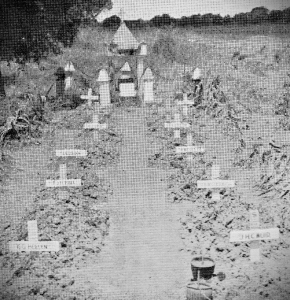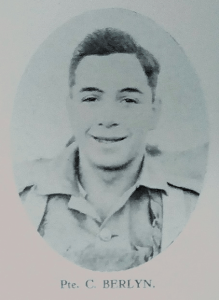 On Sunday, 7 April 2024, six Maritzburg College pilgrims visited the “Gelib Tree” (photo left) in the Lotheni Nature Reserve in the foothills of the Drakensberg, about 15 km from the Lesotho border.
On Sunday, 7 April 2024, six Maritzburg College pilgrims visited the “Gelib Tree” (photo left) in the Lotheni Nature Reserve in the foothills of the Drakensberg, about 15 km from the Lesotho border.
The party was made up of J Havemann, R Havemann, T Marwick, A Tonny (all 2nd Form), L Shangase (5th Form) and Mr M Marwick (staff).
The “Gelib White Flag Incident” took place in modern-day Ethiopia in February 1941, when 13 members of a Royal Natal Carbineers (now the Ingobamakhosi Carbineers) patrol were ambushed and killed by Italians forces, who had shown a white flag and were in the process of negotiating their surrender.
Six of the 13 men were Old Collegians, while OC Lt Derek Norton, who had commanded the patrol and had shown great bravery in the incident, earned a Military Cross, and the survivors of the ambush were rescued by a relief force of fellow Carbineers led by the company commander, (then) Capt Moray Comrie (OC).
The presence of Collegians at Gelib was a strong one – alas, in too many cases, a tragic one, too.
(The photo right is of the Gelib cemetery, shortly after the battle.)
After the skirmish, a Carbineers officer, Capt Charles Eustace, pocketed a few seeds from an acacia tree at Gelib. Years later, on his farm in the Lotheni Valley, he planted them and, as if in memory of the Carbineers who died on that sweltering tropical day in Italian Somaliland, a single acacia tree grew – the “Gelib Tree” of today; a living memorial to gallant men.
The visit on Sunday came because of an invitation to College by the Carbineers’ Association, led by Col. Roy Mottram. We later learned that, every two years, Carbineer veterans and especially members of some of the families of the men involved in the battle in 1941 make the pilgrimage to the Gelib Tree, in memory of the events of long ago.
On Sunday, we arrived at the gates of the Lotheni Nature Reserve, seemingly in good time to join the larger, formal group of about 40 people, accompanied by Piper Ian Turnbull (OC), who planned to walk up to the tree, about 1 km from the parking area.
Unfortunately, when we enquired, “Where is the Gelib Tree?” from a local fly-fisherman, who seemed well-informed, he directed us on a wild goose-chase back from whence we had come – a blundering detour that chewed up 60 valuable minutes. This meant that we did not meet up with the main group in time to start the walk and in fact did not even know where the tree was to be found – a problem exacerbated by the lack of cellphone and internet reception!
 Anyhow, the upshot was that the six Collegians enjoyed an impromptu 7 km trek in the bracing mountain air, eventually sighting the tree in the distance, after a memorable three-hour search (photo left)!
Anyhow, the upshot was that the six Collegians enjoyed an impromptu 7 km trek in the bracing mountain air, eventually sighting the tree in the distance, after a memorable three-hour search (photo left)!
In time, we gathered under the old tree, read the plaque at its shady foot, and quietly honoured the 13 Carbineers killed at Gelib – but especially our seven Old Collegians:
- CG Berlyn (photo below right)

- JA Cowan
- IA Gordon
- BM Hornby
- DB McCullough
- JH Muir
- HRB Varty
Mr Marwick duly produced a hipflask, and, having offered a toast to the fallen men of College, took a healthy swig of its fiery contents.
Much was the rejoicing when we shortly afterwards were able to join up with the main group, including Hiltonians Col. Mottram and Pat Eustace and his family, as well as College’s own Mr Comrie & Son, Mr & Mrs Erskine (née Norton), Mrs Ruth Crouch (née Nicholson) and Piper Ian Turnbull (OC).
Mr Marwick was able to read to the assembled pilgrims a well-crafted account of the battle and its aftermath written for The Natal Witness in 1978 by former College teacher, Mr TB Frost, a poem about the skirmish and the Gelib Tree was read out for the College boys by Mrs Eustace, and Piper Turnbull played a mournful lament (photo).
To Col. Mottram and the Eustaces, and their friends, go the thanks of the group of six College pilgrims, who returned to Maritzburg at 17h00, bedraggled and muddy, but quietly satisfied with their noble adventure.

“At the going down of the sun, and in the morning,
We will remember them.”
MM Marwick, Maritzburg College Archives

